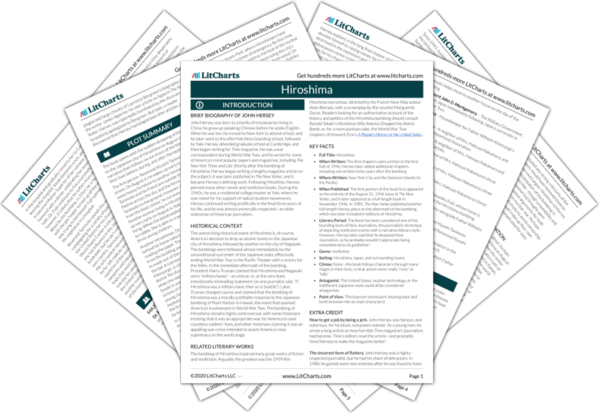The atomic blast over Hiroshima on August 6, 1945 is over in a matter of seconds. And yet the residents of Hiroshima who survived the explosion remember it in vivid detail for the rest of their lives. For most of the book, and especially in the book’s final, long chapter (which was written forty years after the bombing), John Hersey studies the way that Hiroshimans cope with the disaster—an event so vast and destructive that it’s arguably beyond human understanding.
More than once, Hersey explicitly states that a character is trying to forget what they witnessed on August 6, 1945. In psychological terminology, one could say that the Hiroshimans who survive the bombing suffer from trauma: they’ve experienced a sudden disruption in the way their minds process information and, therefore, a disruption in the way they perceive the “normal.” Quite understandably, the Hiroshima survivors want to forget the terrifying spectacle of an entire city’s destruction and return to their normal lives. Hersey suggests that the characters pursue many different strategies in order to reclaim an ordinary life and forget about the past. Dr. Fujii turns to drinking and sex, while Dr. Sasaki hurls himself into his medical practice. Fujii and Sasaki respond to Hiroshima in almost diametrically opposite ways, and yet they’re trying to accomplish the same thing: escape from the trauma of the past by immersing themselves in the present.
Even if the desire to forget about Hiroshima is understandable, Hiroshima suggests that there is something tragic, if not outright dangerous, about the act of forgetting disaster. To paraphrase a well-known quote about history, people need to remember Hiroshima, or else they are “doomed to repeat it.” Indeed, the book suggests that, despite their best efforts, the characters in Hiroshima cannot forget about the past—their memories of the bombing remain viscerally clear after forty years, and continue to cause them tremendous grief and anxiety. Dr. Fujii, for example, seems to commit suicide in part because of his painful memories of Hiroshima. Furthermore, the book suggests that radiation poisoning may become a genetic legacy of the bombing (in more recent years, scientists have confirmed this disturbing possibility). The horrors of the Hiroshima bombing, it would seem, will never be entirely forgotten because they cannot be—the legacy of the bomb is embedded in the DNA of survivors and their descendants. Many of the characters suffer because of their inability to expunge the memory of August 6, 1945, but perhaps it’s important that they—and Hersey himself, in writing his book—keep the memory of Hiroshima alive as a warning for future generations.
Trauma and Memory ThemeTracker

Trauma and Memory Quotes in Hiroshima
At exactly fifteen minutes past eight in the morning, on August 6, 1945, Japanese time, at the moment when the atomic bomb flashed above Hiroshima, Miss Toshiko Sasaki, a clerk in the personnel department of the East Asia Tin Works, had just sat down at her place in the plant office and was turning her head to speak to the girl at the next desk.

Unlock explanations and citation info for this and every other Hiroshima quote.
Plus so much more...
Get LitCharts A+Dr. Sasaki lost all sense of profession and stopped working as a skillful surgeon and a sympathetic man; he became an automaton, mechanically wiping, daubing, winding, wiping, daubing, winding.
All the way, he overtook dreadfully burned and lacerated people, and in his guilt he turned to right and left as he hurried and said to some of them, "Excuse me for having no burden like yours."
He experienced such horror at disturbing the dead—preventing them, he momentarily felt, from launching their craft and going on their ghostly way— that he said out loud, "Please forgive me for taking this boat. I must use it for others, who are alive."
[Fathers Schiffer and LaSalle] thanked God for the care they had received. Thousands of people had nobody to help them.
Japan is dying. If there is a real air raid here in Hiroshima, I want to die with our country.
When they came to know the war was ended—that is, Japan was defeated, they, of course, were deeply disappointed, but followed after their Emperor's commandment in calm spirit, making whole-hearted sacrifice for the everlasting peace of the world—and Japan started her new way.
"My child," Father Kleinsorge said, "man is not now in the condition God intended. He has fallen from grace through sin." And he went on to explain all the reasons for everything.
The bombing almost seemed a natural disaster—one that it had simply been her bad luck, her fate (which must be accepted), to suffer.
Dr. Terufumi Sasaki was still racked by memories of the appalling days and nights right after the explosion—memories it would be his lifework to distance himself from.
He registered himself as a Japanese citizen under the name he would henceforth hear; Father Makoto Takakura.
Her greatest gift, she found, was her ability to help inmates to die in peace. She had seen so much death in Hiroshima after the bombing, and had seen what strange things so many people did when they were cornered by death, that nothing now surprised or frightened her
As the bearers were carrying Dr. Fujii downstairs, he stirred. Swimming up toward consciousness, he apparently thought he was being rescued, somehow, after the atomic bombing. "Who are you?" he asked the bearers. "Are you soldiers?"
Nor did he have any place in the Japanese peace movement, for he had been out of the country at crucial moments in its development and, besides, his Christian outlook made him suspicious of the radical groups that were on the cutting edge of antinuclear activity.
He was slowing down a bit. His memory, like the world's, was getting spotty.











